By Rebecca Gould · Wednesday, April 10, 2013 Rebecca Gould’s “Laws, Exceptions, Norms: Kierkegaard, Schmitt, and Benjamin on the Exception” appears in Telos 162 (Spring 2013). Read the full version online at the Telos Online website, or purchase a print copy of the issue in our store.
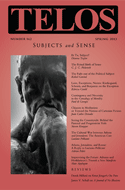 The concept of the exception has heavily shaped modern political theory. In modernity, Kierkegaard was one of the first philosophers to propound the exception as a facilitator of metaphysical transcendence. Merging Kierkegaard’s metaphysical exception with early modern political theorist Jean Bodin’s theory of sovereignty, Carl Schmitt introduced sovereignty to metaphysics. He thereby made an early modern concept usable in a post-metaphysical world. This essay carries Schmitt’s appropriation one step further. Drawing on Walter Benjamin’s replacement of transcendental metaphysics with contingent creaturehood, it reintroduces the anti-foundationalist concept of repetition that was implicit in Kierkegaard’s paradigm but which was not made lucid until Benjamin crafted from the Schmittian exception a vision of political life grounded in creaturely existence. The concept of the exception has heavily shaped modern political theory. In modernity, Kierkegaard was one of the first philosophers to propound the exception as a facilitator of metaphysical transcendence. Merging Kierkegaard’s metaphysical exception with early modern political theorist Jean Bodin’s theory of sovereignty, Carl Schmitt introduced sovereignty to metaphysics. He thereby made an early modern concept usable in a post-metaphysical world. This essay carries Schmitt’s appropriation one step further. Drawing on Walter Benjamin’s replacement of transcendental metaphysics with contingent creaturehood, it reintroduces the anti-foundationalist concept of repetition that was implicit in Kierkegaard’s paradigm but which was not made lucid until Benjamin crafted from the Schmittian exception a vision of political life grounded in creaturely existence.
Continue reading →
By Carlos Gasperi · Thursday, March 21, 2013 The following paper was presented at the Seventh Annual Telos Conference, held on February 15–17, 2013, in New York City.
 In the following, I wish to offer two reflections on the question of religion in Benjamin’s thought, the first of which pertains to the subject of translation, the second of which pertains to history. I will address the former first, for it is here, namely in Benjamin’s concept of “pure language,” that I have derived the eponymous notion of “pure religion.” These reflections will conclude in the form of open-ended questions, which I will elucidate at this time in order to orient my audience with regards to my stakes. The first question is whether the translatability of religious scripture is a condition of possibility for the multiplicity of world religions, and if so, what might the implications of this be. The second question, which I will distill from the first, is whether historicity, or what is in Benjamin the strife between historical materialism and historiography, grounds the essence, or “purity,” of religious experience. In the following, I wish to offer two reflections on the question of religion in Benjamin’s thought, the first of which pertains to the subject of translation, the second of which pertains to history. I will address the former first, for it is here, namely in Benjamin’s concept of “pure language,” that I have derived the eponymous notion of “pure religion.” These reflections will conclude in the form of open-ended questions, which I will elucidate at this time in order to orient my audience with regards to my stakes. The first question is whether the translatability of religious scripture is a condition of possibility for the multiplicity of world religions, and if so, what might the implications of this be. The second question, which I will distill from the first, is whether historicity, or what is in Benjamin the strife between historical materialism and historiography, grounds the essence, or “purity,” of religious experience.
Continue reading →
By Tomash Dabrowski · Tuesday, October 2, 2012 As an occasional feature on TELOSscope, we highlight a past Telos article whose critical insights continue to illuminate our thinking and challenge our assumptions. Today, Tomash Dabrowski looks at Richard Wolin’s “An Aesthetic of Redemption: Benjamin’s Path to Trauerspiel“ from Telos 43 (Spring 1980).
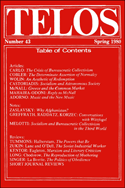 Despite renewed interest in Walter Benjamin, his work still remains enigmatic seventy years after his death, and the obscurity of his thought is compounded by the efforts of friends and associates wishing to reclaim his work to their respective traditions. Those who knew him during his lifetime—and especially those instrumental to the belated dissemination of his work—sometimes repudiate his theological motifs, others his particular variant of Marxism (or questioning whether he could be called a Marxist at all). But there seems to be a consensus as to their incongruity. Adorno for instance once chastised Benjamin’s work as “undialectical,” and Gershom Scholem found his theology to be plagued by ill-conceived communist alliances (which is to say nothing about his dispute with Hannah Arendt about which school of thought Benjamin’s contribution legitimately lies). Leszek Kołakowski’s reading, in his eminent Main Currents of Marxism, is emblematic of the mischief caused by measuring Benjamin’s work against the weight of tradition. Kołakowski finds that Benjamin “seems to have tried to graft historical materialism on his own theory of culture, which had nothing to do with Marxism and which he had worked out beforehand.” Despite renewed interest in Walter Benjamin, his work still remains enigmatic seventy years after his death, and the obscurity of his thought is compounded by the efforts of friends and associates wishing to reclaim his work to their respective traditions. Those who knew him during his lifetime—and especially those instrumental to the belated dissemination of his work—sometimes repudiate his theological motifs, others his particular variant of Marxism (or questioning whether he could be called a Marxist at all). But there seems to be a consensus as to their incongruity. Adorno for instance once chastised Benjamin’s work as “undialectical,” and Gershom Scholem found his theology to be plagued by ill-conceived communist alliances (which is to say nothing about his dispute with Hannah Arendt about which school of thought Benjamin’s contribution legitimately lies). Leszek Kołakowski’s reading, in his eminent Main Currents of Marxism, is emblematic of the mischief caused by measuring Benjamin’s work against the weight of tradition. Kołakowski finds that Benjamin “seems to have tried to graft historical materialism on his own theory of culture, which had nothing to do with Marxism and which he had worked out beforehand.”
Continue reading →
By Sean Franzel · Thursday, July 19, 2012 Sean Franzel’s “Toward an Anti-Monumental Literary-Critical Style: Notes on Benjamin and Jean Paul” appears in Telos 159 (Summer 2012). Read the full version online at the Telos Online website, or purchase a print copy of the issue here.
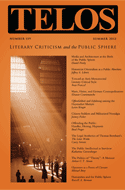 This essay— modest notes rather than a systematic exploration of the problem of critical style— examines certain striking similarities between the critical vocabularies of Jean Paul and Walter Benjamin. In rejecting heroic conceptions of individual authorship, both writers treat the personal lives of literary figures as phenomena of larger significance, and both seek to undermine metaphors of monumentality. Through readings of Jean Paul’s 1804 Vorschule der Ästhetik (School of Aesthetics) and Benjamin’s pseudonymously published 1936 anthology Deutsche Menschen (German Men and Women), this essay argues that both writers remind us of the decidedly human sides of literary and critical life: of the weaknesses and limitations of this life, that is to say, as well as its potential for ethical direction. This essay— modest notes rather than a systematic exploration of the problem of critical style— examines certain striking similarities between the critical vocabularies of Jean Paul and Walter Benjamin. In rejecting heroic conceptions of individual authorship, both writers treat the personal lives of literary figures as phenomena of larger significance, and both seek to undermine metaphors of monumentality. Through readings of Jean Paul’s 1804 Vorschule der Ästhetik (School of Aesthetics) and Benjamin’s pseudonymously published 1936 anthology Deutsche Menschen (German Men and Women), this essay argues that both writers remind us of the decidedly human sides of literary and critical life: of the weaknesses and limitations of this life, that is to say, as well as its potential for ethical direction.
By Ulrike Kistner · Tuesday, January 31, 2012 Ulrike Kistner’s “The Exception and the Rule: Fictive, Real, Critical” appears in Telos 157 (Winter 2011). Read the full version online at the TELOS Online website, or purchase a print copy of the issue here.
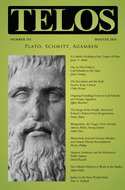 Walter Benjamin’s famous statement, in the eighth of his “Theses on the Philosophy of History” (1940), that “the state of exception in which we live is not the exception but the rule,” has become as normalized as its proposition asserts. Yet it has given rise to different and contrasting understandings variously bounced around between Carl Schmitt, Benjamin, and Giorgio Agamben. Benjamin’s thesis could be read in correlation with Schmitt’s invocation of the state of exception to protect the Weimar Constitution from its own fragility. However, this would not explain the adjective “real” in “a real state of exception” of the task posed by the thesis. The term clearly points in the direction of the distinction between “fictive” and “real” states of exception, which in turn brings into focus the distinction and relation between sovereign and commissarial dictatorship, as outlined by Schmitt in his history of the concept of sovereignty. It is within the paradox of an impossible form of sovereign dictatorship that Schmitt indicates the possibility of constituent power in constitutional democracies. This idea can be connected with the ruptural power of divine violence of Benjamin’s “Critique of Violence” (1921). While Agamben recognizes some of the lines of derivation of “state of siege” and “state of exception,” he does not realize the critical force of Schmitt’s paradox of sovereign dictatorship or Benjamin’s notion of pure violence. This blind spot is consequential: it eclipses the possibility of critique, along with the imagination figuring possibilities of the new. Walter Benjamin’s famous statement, in the eighth of his “Theses on the Philosophy of History” (1940), that “the state of exception in which we live is not the exception but the rule,” has become as normalized as its proposition asserts. Yet it has given rise to different and contrasting understandings variously bounced around between Carl Schmitt, Benjamin, and Giorgio Agamben. Benjamin’s thesis could be read in correlation with Schmitt’s invocation of the state of exception to protect the Weimar Constitution from its own fragility. However, this would not explain the adjective “real” in “a real state of exception” of the task posed by the thesis. The term clearly points in the direction of the distinction between “fictive” and “real” states of exception, which in turn brings into focus the distinction and relation between sovereign and commissarial dictatorship, as outlined by Schmitt in his history of the concept of sovereignty. It is within the paradox of an impossible form of sovereign dictatorship that Schmitt indicates the possibility of constituent power in constitutional democracies. This idea can be connected with the ruptural power of divine violence of Benjamin’s “Critique of Violence” (1921). While Agamben recognizes some of the lines of derivation of “state of siege” and “state of exception,” he does not realize the critical force of Schmitt’s paradox of sovereign dictatorship or Benjamin’s notion of pure violence. This blind spot is consequential: it eclipses the possibility of critique, along with the imagination figuring possibilities of the new.
Continue reading →
By Michael Bacal · Tuesday, November 29, 2011 As an occasional feature on TELOSscope, we highlight a past Telos article whose critical insights continue to illuminate our thinking and challenge our assumptions. Today, Michael Bacal looks at Howard Eiland’s “Superimposition in Walter Benjamin’s Arcades Projects,” from Telos 138 (Spring 2007).
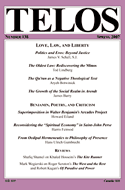 Walter Benjamin’s Arcades Project is likely the most jarring and ambitious work of cultural history of the twentieth century. Breathtaking in its scope, brilliant in its insight, and stamped throughout with his inimitable style, it is the unfinished, thirteen-year project Benjamin attempted as an encyclopedic capture of the emergence of Paris as the capital of the nineteenth century. Touching on everything from urban development to literary analysis and revolutionary consciousness, it presents a vast palimpsest of quotations, theoretical reflections, and minutiae taken from the most quotidian aspects of Parisian life. In a recent Telos article, Howard Eiland, one of the translators responsible for bringing the Passagenwerk into English, offers a compelling overview of Benjamin’s text and a stable set of theoretical coordinates with which to navigate it. His essay, “Superimposition in Walter Benjamin’s Arcades Project,” does this by putting forth the figure of the flâneur as the organizing locus of the book and by developing his unique experience of the world as central not only to the text but also to Benjamin’s theoretical project as a whole. By elaborating this through the notion of “superimposition,” Eiland outlines the singular experience of the flâneur and connects it with the broader historical and political dimensions to which it opens. Walter Benjamin’s Arcades Project is likely the most jarring and ambitious work of cultural history of the twentieth century. Breathtaking in its scope, brilliant in its insight, and stamped throughout with his inimitable style, it is the unfinished, thirteen-year project Benjamin attempted as an encyclopedic capture of the emergence of Paris as the capital of the nineteenth century. Touching on everything from urban development to literary analysis and revolutionary consciousness, it presents a vast palimpsest of quotations, theoretical reflections, and minutiae taken from the most quotidian aspects of Parisian life. In a recent Telos article, Howard Eiland, one of the translators responsible for bringing the Passagenwerk into English, offers a compelling overview of Benjamin’s text and a stable set of theoretical coordinates with which to navigate it. His essay, “Superimposition in Walter Benjamin’s Arcades Project,” does this by putting forth the figure of the flâneur as the organizing locus of the book and by developing his unique experience of the world as central not only to the text but also to Benjamin’s theoretical project as a whole. By elaborating this through the notion of “superimposition,” Eiland outlines the singular experience of the flâneur and connects it with the broader historical and political dimensions to which it opens.
Continue reading →
|
|
 The concept of the exception has heavily shaped modern political theory. In modernity, Kierkegaard was one of the first philosophers to propound the exception as a facilitator of metaphysical transcendence. Merging Kierkegaard’s metaphysical exception with early modern political theorist Jean Bodin’s theory of sovereignty, Carl Schmitt introduced sovereignty to metaphysics. He thereby made an early modern concept usable in a post-metaphysical world. This essay carries Schmitt’s appropriation one step further. Drawing on Walter Benjamin’s replacement of transcendental metaphysics with contingent creaturehood, it reintroduces the anti-foundationalist concept of repetition that was implicit in Kierkegaard’s paradigm but which was not made lucid until Benjamin crafted from the Schmittian exception a vision of political life grounded in creaturely existence.
The concept of the exception has heavily shaped modern political theory. In modernity, Kierkegaard was one of the first philosophers to propound the exception as a facilitator of metaphysical transcendence. Merging Kierkegaard’s metaphysical exception with early modern political theorist Jean Bodin’s theory of sovereignty, Carl Schmitt introduced sovereignty to metaphysics. He thereby made an early modern concept usable in a post-metaphysical world. This essay carries Schmitt’s appropriation one step further. Drawing on Walter Benjamin’s replacement of transcendental metaphysics with contingent creaturehood, it reintroduces the anti-foundationalist concept of repetition that was implicit in Kierkegaard’s paradigm but which was not made lucid until Benjamin crafted from the Schmittian exception a vision of political life grounded in creaturely existence.  In the following, I wish to offer two reflections on the question of religion in Benjamin’s thought, the first of which pertains to the subject of translation, the second of which pertains to history. I will address the former first, for it is here, namely in Benjamin’s concept of “pure language,” that I have derived the eponymous notion of “pure religion.” These reflections will conclude in the form of open-ended questions, which I will elucidate at this time in order to orient my audience with regards to my stakes. The first question is whether the translatability of religious scripture is a condition of possibility for the multiplicity of world religions, and if so, what might the implications of this be. The second question, which I will distill from the first, is whether historicity, or what is in Benjamin the strife between historical materialism and historiography, grounds the essence, or “purity,” of religious experience.
In the following, I wish to offer two reflections on the question of religion in Benjamin’s thought, the first of which pertains to the subject of translation, the second of which pertains to history. I will address the former first, for it is here, namely in Benjamin’s concept of “pure language,” that I have derived the eponymous notion of “pure religion.” These reflections will conclude in the form of open-ended questions, which I will elucidate at this time in order to orient my audience with regards to my stakes. The first question is whether the translatability of religious scripture is a condition of possibility for the multiplicity of world religions, and if so, what might the implications of this be. The second question, which I will distill from the first, is whether historicity, or what is in Benjamin the strife between historical materialism and historiography, grounds the essence, or “purity,” of religious experience.  Despite renewed interest in Walter Benjamin, his work still remains enigmatic seventy years after his death, and the obscurity of his thought is compounded by the efforts of friends and associates wishing to reclaim his work to their respective traditions. Those who knew him during his lifetime—and especially those instrumental to the belated dissemination of his work—sometimes repudiate his theological motifs, others his particular variant of Marxism (or questioning whether he could be called a Marxist at all). But there seems to be a consensus as to their incongruity. Adorno for instance once chastised Benjamin’s work as “undialectical,” and Gershom Scholem found his theology to be plagued by ill-conceived communist alliances (which is to say nothing about his dispute with Hannah Arendt about which school of thought Benjamin’s contribution legitimately lies). Leszek Kołakowski’s reading, in his eminent Main Currents of Marxism, is emblematic of the mischief caused by measuring Benjamin’s work against the weight of tradition. Kołakowski finds that Benjamin “seems to have tried to graft historical materialism on his own theory of culture, which had nothing to do with Marxism and which he had worked out beforehand.”
Despite renewed interest in Walter Benjamin, his work still remains enigmatic seventy years after his death, and the obscurity of his thought is compounded by the efforts of friends and associates wishing to reclaim his work to their respective traditions. Those who knew him during his lifetime—and especially those instrumental to the belated dissemination of his work—sometimes repudiate his theological motifs, others his particular variant of Marxism (or questioning whether he could be called a Marxist at all). But there seems to be a consensus as to their incongruity. Adorno for instance once chastised Benjamin’s work as “undialectical,” and Gershom Scholem found his theology to be plagued by ill-conceived communist alliances (which is to say nothing about his dispute with Hannah Arendt about which school of thought Benjamin’s contribution legitimately lies). Leszek Kołakowski’s reading, in his eminent Main Currents of Marxism, is emblematic of the mischief caused by measuring Benjamin’s work against the weight of tradition. Kołakowski finds that Benjamin “seems to have tried to graft historical materialism on his own theory of culture, which had nothing to do with Marxism and which he had worked out beforehand.”  This essay— modest notes rather than a systematic exploration of the problem of critical style— examines certain striking similarities between the critical vocabularies of Jean Paul and Walter Benjamin. In rejecting heroic conceptions of individual authorship, both writers treat the personal lives of literary figures as phenomena of larger significance, and both seek to undermine metaphors of monumentality. Through readings of Jean Paul’s 1804 Vorschule der Ästhetik (School of Aesthetics) and Benjamin’s pseudonymously published 1936 anthology Deutsche Menschen (German Men and Women), this essay argues that both writers remind us of the decidedly human sides of literary and critical life: of the weaknesses and limitations of this life, that is to say, as well as its potential for ethical direction.
This essay— modest notes rather than a systematic exploration of the problem of critical style— examines certain striking similarities between the critical vocabularies of Jean Paul and Walter Benjamin. In rejecting heroic conceptions of individual authorship, both writers treat the personal lives of literary figures as phenomena of larger significance, and both seek to undermine metaphors of monumentality. Through readings of Jean Paul’s 1804 Vorschule der Ästhetik (School of Aesthetics) and Benjamin’s pseudonymously published 1936 anthology Deutsche Menschen (German Men and Women), this essay argues that both writers remind us of the decidedly human sides of literary and critical life: of the weaknesses and limitations of this life, that is to say, as well as its potential for ethical direction.  Walter Benjamin’s famous statement, in the eighth of his “Theses on the Philosophy of History” (1940), that “the state of exception in which we live is not the exception but the rule,” has become as normalized as its proposition asserts. Yet it has given rise to different and contrasting understandings variously bounced around between Carl Schmitt, Benjamin, and Giorgio Agamben. Benjamin’s thesis could be read in correlation with Schmitt’s invocation of the state of exception to protect the Weimar Constitution from its own fragility. However, this would not explain the adjective “real” in “a real state of exception” of the task posed by the thesis. The term clearly points in the direction of the distinction between “fictive” and “real” states of exception, which in turn brings into focus the distinction and relation between sovereign and commissarial dictatorship, as outlined by Schmitt in his history of the concept of sovereignty. It is within the paradox of an impossible form of sovereign dictatorship that Schmitt indicates the possibility of constituent power in constitutional democracies. This idea can be connected with the ruptural power of divine violence of Benjamin’s “Critique of Violence” (1921). While Agamben recognizes some of the lines of derivation of “state of siege” and “state of exception,” he does not realize the critical force of Schmitt’s paradox of sovereign dictatorship or Benjamin’s notion of pure violence. This blind spot is consequential: it eclipses the possibility of critique, along with the imagination figuring possibilities of the new.
Walter Benjamin’s famous statement, in the eighth of his “Theses on the Philosophy of History” (1940), that “the state of exception in which we live is not the exception but the rule,” has become as normalized as its proposition asserts. Yet it has given rise to different and contrasting understandings variously bounced around between Carl Schmitt, Benjamin, and Giorgio Agamben. Benjamin’s thesis could be read in correlation with Schmitt’s invocation of the state of exception to protect the Weimar Constitution from its own fragility. However, this would not explain the adjective “real” in “a real state of exception” of the task posed by the thesis. The term clearly points in the direction of the distinction between “fictive” and “real” states of exception, which in turn brings into focus the distinction and relation between sovereign and commissarial dictatorship, as outlined by Schmitt in his history of the concept of sovereignty. It is within the paradox of an impossible form of sovereign dictatorship that Schmitt indicates the possibility of constituent power in constitutional democracies. This idea can be connected with the ruptural power of divine violence of Benjamin’s “Critique of Violence” (1921). While Agamben recognizes some of the lines of derivation of “state of siege” and “state of exception,” he does not realize the critical force of Schmitt’s paradox of sovereign dictatorship or Benjamin’s notion of pure violence. This blind spot is consequential: it eclipses the possibility of critique, along with the imagination figuring possibilities of the new.  Walter Benjamin’s Arcades Project is likely the most jarring and ambitious work of cultural history of the twentieth century. Breathtaking in its scope, brilliant in its insight, and stamped throughout with his inimitable style, it is the unfinished, thirteen-year project Benjamin attempted as an encyclopedic capture of the emergence of Paris as the capital of the nineteenth century. Touching on everything from urban development to literary analysis and revolutionary consciousness, it presents a vast palimpsest of quotations, theoretical reflections, and minutiae taken from the most quotidian aspects of Parisian life. In a recent Telos article, Howard Eiland, one of the translators responsible for bringing the Passagenwerk into English, offers a compelling overview of Benjamin’s text and a stable set of theoretical coordinates with which to navigate it. His essay, “Superimposition in Walter Benjamin’s Arcades Project,” does this by putting forth the figure of the flâneur as the organizing locus of the book and by developing his unique experience of the world as central not only to the text but also to Benjamin’s theoretical project as a whole. By elaborating this through the notion of “superimposition,” Eiland outlines the singular experience of the flâneur and connects it with the broader historical and political dimensions to which it opens.
Walter Benjamin’s Arcades Project is likely the most jarring and ambitious work of cultural history of the twentieth century. Breathtaking in its scope, brilliant in its insight, and stamped throughout with his inimitable style, it is the unfinished, thirteen-year project Benjamin attempted as an encyclopedic capture of the emergence of Paris as the capital of the nineteenth century. Touching on everything from urban development to literary analysis and revolutionary consciousness, it presents a vast palimpsest of quotations, theoretical reflections, and minutiae taken from the most quotidian aspects of Parisian life. In a recent Telos article, Howard Eiland, one of the translators responsible for bringing the Passagenwerk into English, offers a compelling overview of Benjamin’s text and a stable set of theoretical coordinates with which to navigate it. His essay, “Superimposition in Walter Benjamin’s Arcades Project,” does this by putting forth the figure of the flâneur as the organizing locus of the book and by developing his unique experience of the world as central not only to the text but also to Benjamin’s theoretical project as a whole. By elaborating this through the notion of “superimposition,” Eiland outlines the singular experience of the flâneur and connects it with the broader historical and political dimensions to which it opens. 

